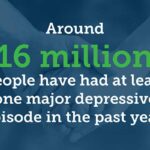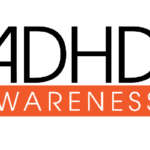Seasonal Depression and Holiday Blues: Tips For Coping

Millions of Americans suffer from seasonal depression, seasonal affective disorder, or the “holiday blues” every year, and there are lots of valid reasons why. Shorter daylight hours, cold weather, and holiday stress can all contribute to seasonal depression symptoms.
Anyone can experience symptoms of depression during the shorter days and holidays, no matter the age or person.
Seasonal Depression Symptoms
- Change in mood
- Oversleeping
- Daytime fatigue
- Sleep changes
- Social withdrawal
- Aches and Pains
- Increased appetite and cravings, especially for carbohydrates
- Weight gain
- Lack of interest in normal activities and social interactions
- Decreased sexual desire
Seasonal Affective Disorder
Seasonal Affective Disorder, aptly called SAD for short, affects around 10 million Americans each winter and is a subtype of depression.
This can be due to shorter days, less sunlight, lower vitamin D levels, and colder weather. The change in daylight and circadian rhythms can interrupt the release of serotonin and melatonin, impacting our sleep and mood. Symptoms of SAD vary from mild melancholy to deep and persistent feelings of depression.
Just because your depression is seasonal doesn’t mean it isn’t real.
SAD can make you feel sluggish, tired, and contribute to weight fluctuations. If you’ve noticed that you consistently feel depressed, unmotivated, and tired during the winter months, you should talk to your doctor or mental health provider about SAD.
Tips To Reduce Symptoms of Seasonal Affective Disorder
- Boost Vitamin D levels
- Get more exercise, particularly aerobic
- Practice good sleep hygiene, including turning off all technology at least one hour before bedtime
- Keep a consistent sleep schedule routine
- Sit near a window as often as possible during the daylight hours
- Eliminate long naps
- Get outdoors, even for a few minutes daily can help
- Try using light therapy (a light box or sun lamp) with a LUX rating of 10,000 for 30-60 minutes in the morning
Our team of providers can help determine if medication may be appropriate for your seasonal affective disorder symptoms.
Our Experienced Team of Psychiatrists Can Help!
We know that taking the first step can be difficult.
Our highly-trained psychiatrists and therapists offer a comprehensive and confidential approach to private, outpatient psychiatric care. Whether this is your first time seeking psychiatric care or if you are seeking a new provider, Novum Psychiatry can help. In-person and telehealth appointments available. We accept health insurance.
Holiday Blues
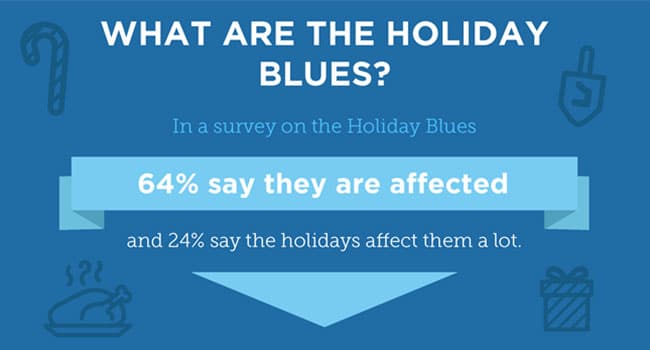
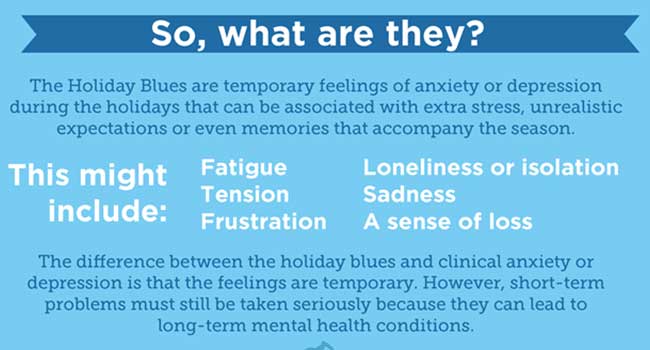
If your sadness seems less to do with the season and more directly linked to the holidays, you may be experiencing a phenomenon known as the “holiday blues.” The holiday blues can encompass a wide spectrum of negative feelings, including stress, anxiety, depression, lethargy, or anger.
Why can a time of celebration cause so many bad feelings?
Financial Concerns
Financial concerns can be very high up on the list. Feeling obligated to buy gifts, decorations, or plane tickets that you can’t afford can cause depression, anxiety, and resentment.
Family Dynamics
Spending time with families can dig up a range of problems from differing political views, judgment of life choices, estrangement, and rejection. Those who have been cast out due to their sexuality or gender identity can feel the weight of that more intensely during the holidays. Many people find holidays stressful because of family tensions and conflict.
Negative Self-Talk
You may also feel sad due to your own self-talk. It can be easy to feel like you have failed if you didn’t accomplish your New Year’s Resolution from the year before. Or maybe you simply feel guilty about your normal depression symptoms, or for not sharing in the enthusiasm and excitement of those around you. Or maybe you are struggling with the urge to isolate, to protect your friends and family from your feelings of sadness. Maybe you just feel yucky, and have no idea why.
Whatever the cause, it’s important to remember that these feelings are normal and valid!
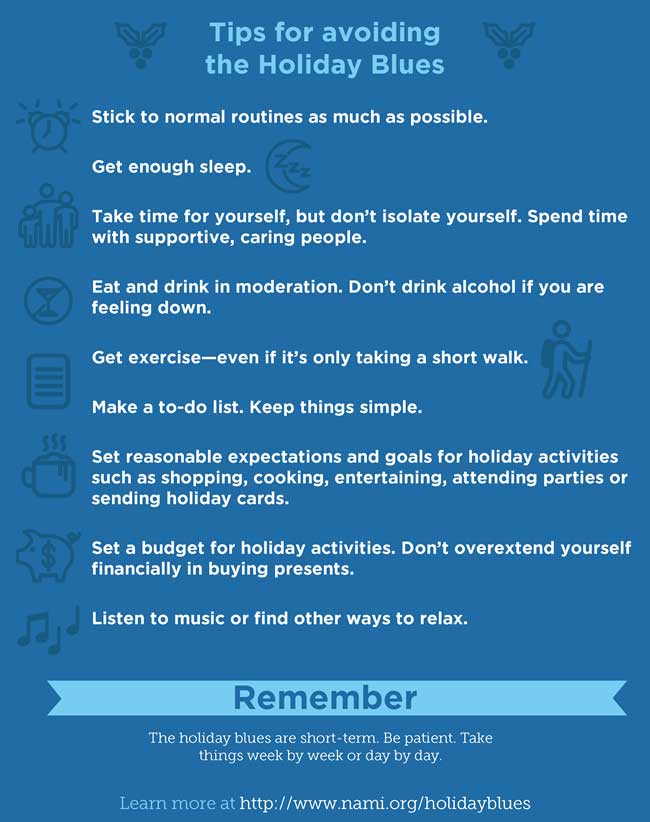
Holiday Depression in Seniors and Older Adults
Depression in older adults is often overlooked because changes in mood can be caused by medications or health problems. Senior Depression is much more complicated than that, though.
This type of depression commonly presents as a total lack of feelings, or feeling emotionally “numb,” rather than an overtly obvious sadness. You may also be feeling fatigued, apathetic, more achy than normal, forgetful, or unable to sleep at night. Anxiety is also common in older adults.
These feelings can stem from the many changes happening at this stage of life, and the holidays can shine a bright light on these changes. It’s painful and sad to lose friends and loved ones, and feeling forgotten or alone as your children and grandchildren grow up and start their own families. Or maybe you’re facing the reality of an aging body and increasing health problems.
Older adults who are struggling from depression, anxiety, apathy, sleeping problems, or memory problems should speak with a mental health provider. Senior Depression may be common, but the good news is, it’s also treatable.
Treating Holiday Blues
If your holiday funk is interfering with your day to day activities, your productivity, or your physical and mental wellbeing, don’t ignore it. There is no reason to suffer needlessly when there are real options to feel relief.
- Don’t be afraid to prioritize yourself this holiday season. If you don’t want to participate in gift exchanges, say so. If being around family or hosting a big celebration is too stressful or hurtful, opt out this year. You have the right to feel happy and healthy, and you aren’t obligated to do anything that negatively affects your well-being.
- Use your support network. If you’re feeling depressed or anxious, let your loved ones know! Everything is easier when you don’t have to go it alone. If you don’t feel like you can open up to anyone in your circle, consider anonymous groups or online forums. Try your local rec center, church, or support groups; it is powerful to know you’re not the only one.
- Use Cognitive Behavioral Therapy for holiday depression. CBT can to help manage expectations and simplify your holiday experience. With Cognitive Behavioral Therapy you learn to recognize unhealthy thought patterns and and work toward action-oriented solutions. You may not always be able to change or eliminate the triggers of your holiday depression or anxiety, but you can change how you react and respond to them, and that can help improve your holiday experience.
If you’ve never gone to therapy before, or worry about “stigma,” don’t stress! You’ll be joining an increasing number of Americans who decided to seek out therapy and take control of their mental health.
Is Seasonal Depression Worth Treating?
Just like other forms of depression and anxiety, the overwhelming majority of those who seek treatment for seasonal or holiday depression show marked improvement. The most commonly used treatments are antidepressant medication, psychotherapy or a combination of the two. Learn more about therapy and medication .
The choice of treatment depends on the pattern, severity, persistence of holiday depressive symptoms and the history of the illness. As with other forms of depression, early treatment of holiday depression is more effective and helps prevent the likelihood of serious recurrences. Left untreated, symptoms of holiday depression can persist beyond the holiday season.
Holiday depression and seasonal affective disorder must be treated by a physician or qualified mental health professional.
It’s okay to not feel okay this holiday season! The Board Certified psychiatrists of Novum Psychiatry have extensive experience in the screening, diagnosis, and treatment of all types of seasonal depression and anxiety – including the holiday blues.
Our Plainville and Sudbury offices are accepting new patients for in-person and telemedicine appointments for residents of Massachusetts and Rhode Island. We also take a wide range of health insurance plans, including Medicare. Request your confidential evaluation today.


